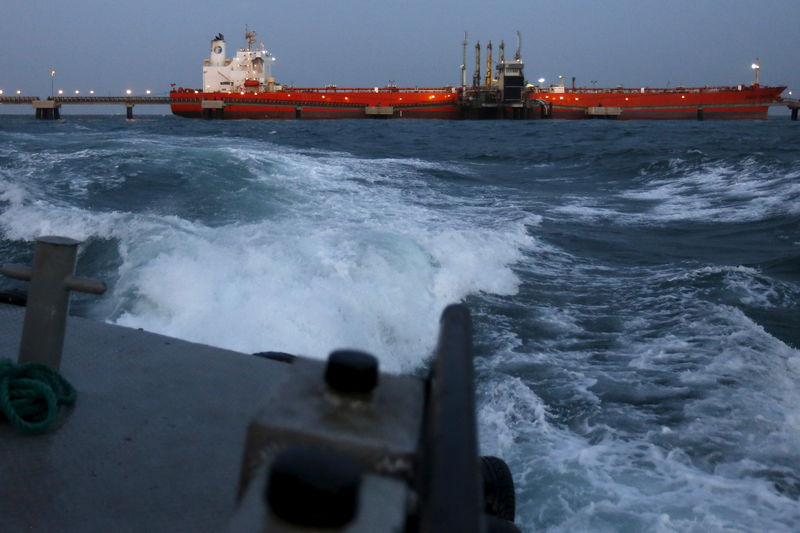 © Reuters. FILE PHOTO: An oil tanker is docked while oil is pumped into it at the terminal of PDVSA’s Jose Antonio Anzoategui industrial complex in the state of Anzoategui
© Reuters. FILE PHOTO: An oil tanker is docked while oil is pumped into it at the terminal of PDVSA’s Jose Antonio Anzoategui industrial complex in the state of AnzoateguiBy Marianna Parraga
(Reuters) – Venezuela’s state-run oil firm PDVSA [PDVSA.UL] has begun talks with shipping firms to set up a second ship-to-ship (STS) operation off the country’s eastern coast in an effort to increase sagging crude exports, according to three people familiar with the matter.
PDVSA this year began sea-borne oil transfers off its western coast, mainly to move crude and fuel oil to Asia, after its ports clogged with tankers waiting to load and its Caribbean terminals faced seizure.
PDVSA’s STS activity has expanded recently, but not enough to expedite operations at its main oil port of Jose, according to Refinitiv Eikon data.
The country’s crude exports fell 21 percent to an average 1.126 million barrels per day (bpd) between January and October, according to Refinitiv Eikon data. At the end of the first half, PDVSA’s contractual obligations totaled 2.19 million bpd.
PDVSA has not yet chosen a firm to handle the new STS operation. Among the companies being considered is a unit of Dubai-based Stalco Shipping Co, according to one of the people.
PDVSA declined to comment, and Stalco did not respond to a request for comment.
“Certified captains and mooring masters are being recruited for the project,” one person familiar with the matter said.
TWO AT A TIME
The new STS operation would be installed near La Borracha island, about 16 kilometers (10 miles) off Puerto la Cruz, one of Venezuela’s main coastal cities, one of the sources said.
PDVSA plans to use some of its larger vessels, including Suezmaxes and very large crude carriers as mother ships, to build the operation. Up to two tankers could simultaneously load oil through this system, according to the sources.
Sea-borne transfers are risky to tankers and the environment, require additional insurance, equipment and specially trained crew and masters to oversee the exchanges. PDVSA has sought approval to conduct the transfers from INEA, Venezuela’s water authority, one of the people familiar with the matter said.
But it was unclear if authorities have given PDVSA permission to conduct the operations in an ecologically sensitive area, at Mochima National Park.
Venezuela’s Ecosocialism ministry did not respond to a request for comment.
Most PDVSA-owned tankers used for exports have been anchored in Venezuelan waters since U.S. producer ConocoPhillips (NYSE:) moved to seize Caribbean export assets last spring to enforce a $2 billion arbitration ruling. It reached a payment agreement this fall, but the seizure risk remains as other creditors could employ a similar strategy.
PDVSA also was forced to close one of three docks at its Jose terminal for almost 90 days following a tanker collision in August, complicating its efforts to increase crude exports.
“The idea is to change as many contracts as possible to FOB (free on board),” one of the people said, requiring product to be delivered at the seller’s port and buyers to make logistical arrangements.
PDVSA’s customers would be responsible for paying STS fees to the operating company, the sources added, slightly changing a mechanism used for the STS operation off the Paraguana Refining Center, which requires clients to bring their own equipment.
Source: Investing.com



























